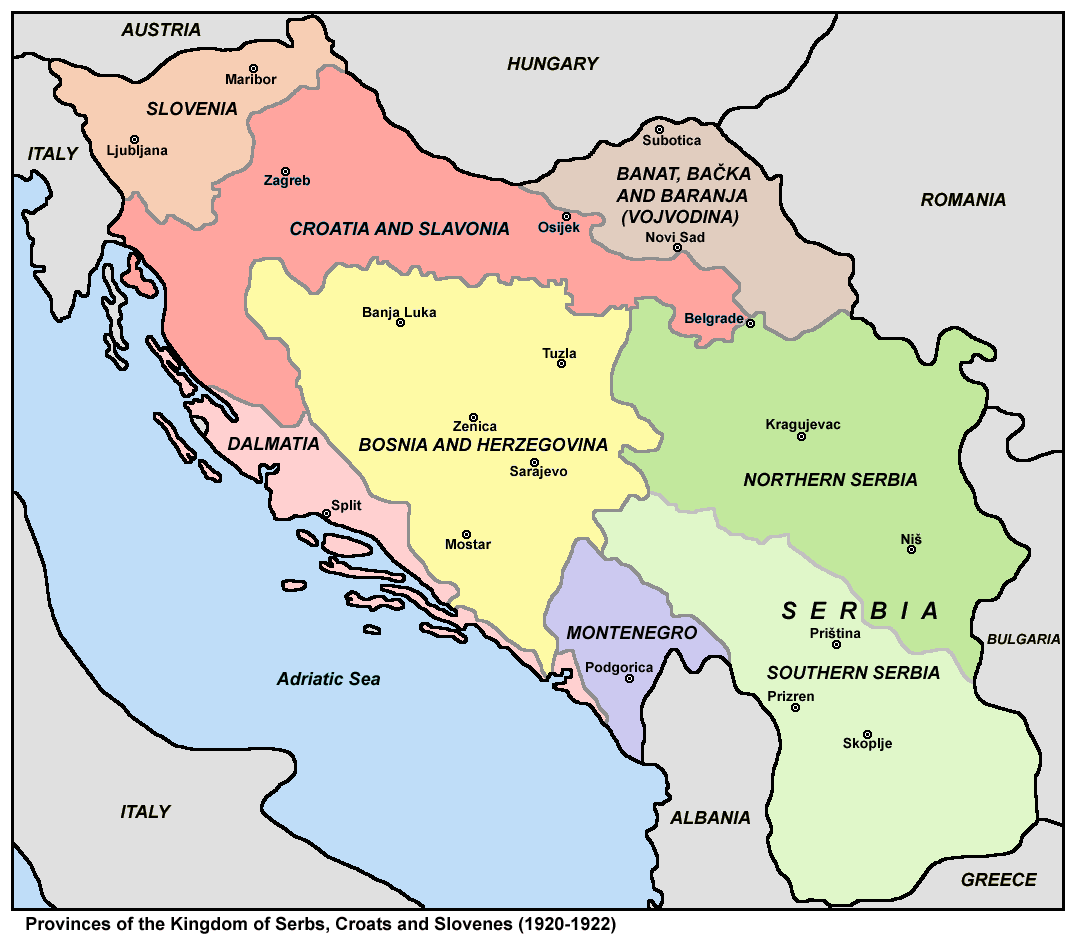|
Vance–Owen Plan
Four major international peace plans were proposed before and during the Bosnian War by European Community (EC) and United Nations (UN) diplomats before the conflict was settled by the Dayton Agreement in 1995. Background The Bosnian war which lasted from 1992 to 1995 was fought among its three main ethnicities Bosniaks, Croats and Serbs. Whilst the Bosniak plurality had sought a nation state across all ethnic lines, the Croats had created an autonomous community that functioned independently of central Bosnian rule, and the Serbs declared independence for the region's eastern and northern regions relevant to the Serb population. All peace plans were proposed with the view to observing Bosnia and Herzegovina as a sovereign state entire of its territorial integrity (as it had been in Yugoslavia as the SR Bosnia and Herzegovina) and without an imbalance of greater devolution and autonomy awarded to any community or region. Carrington–Cutileiro plan The original Carrington– ... [...More Info...] [...Related Items...] OR: [Wikipedia] [Google] [Baidu] |
European Community
The European Economic Community (EEC) was a regional organization created by the Treaty of Rome of 1957,Today the largely rewritten treaty continues in force as the ''Treaty on the functioning of the European Union'', as renamed by the Lisbon Treaty. aiming to foster economic integration among its member states. It was subsequently renamed the European Community (EC) upon becoming integrated into the first pillar of the newly formed European Union in 1993. In the popular language, however, the singular ''European Community'' was sometimes inaccuratelly used in the wider sense of the plural '' European Communities'', in spite of the latter designation covering all the three constituent entities of the first pillar. In 2009, the EC formally ceased to exist and its institutions were directly absorbed by the EU. This made the Union the formal successor institution of the Community. The Community's initial aim was to bring about economic integration, including a common market and ... [...More Info...] [...Related Items...] OR: [Wikipedia] [Google] [Baidu] |
Bosnian Serbs
The Serbs of Bosnia and Herzegovina ( sr-Cyrl, Срби у Босни и Херцеговини, Srbi u Bosni i Hercegovini) are one of the three constitutive nations (state-forming nations) of the country, predominantly residing in the political-territorial entity of Republika Srpska. In the other entity, Federation of Bosnia and Herzegovina, Serbs form the majority in Drvar, Glamoč, Bosansko Grahovo and Bosanski Petrovac. They are frequently referred to as Bosnian Serbs ( sr, босански Срби, Bosanski Srbi) in English, regardless of whether they are from Bosnia or Herzegovina. They are also known by regional names such as ''Krajišnici'' ("frontiersmen" of Bosanska Krajina), ''Semberci'' ( Semberians), ''Bosanci'' (Bosnians), ''Birčani'' (''Bircians''), Romanijci (''Romanijans''), ''Posavci'' (Posavians), ''Hercegovci'' (Herzegovinians). Serbs have a long and continuous history of inhabiting the present-day territory of Bosnia and Herzegovina, and a long history ... [...More Info...] [...Related Items...] OR: [Wikipedia] [Google] [Baidu] |
Partition Of Bosnia And Herzegovina
The partition of Bosnia and Herzegovina was discussed and attempted during the 20th century. The issue came to prominence during the Bosnian War, which also involved Bosnia and Herzegovina's largest neighbors, Croatia and Serbia. As of , the country remains one state while internal political divisions of Bosnia and Herzegovina based on the 1995 Dayton Agreement remain in place. Background Bosnia and Herzegovina has been a single entity occupying roughly the same territory since the rise of the medieval Kingdom of Bosnia and the subsequent Ottoman conquest of Bosnia between the 1380s and 1590s. The borders of today's Bosnia and Herzegovina were largely set as the borders of the Ottoman-era Eyalet of Bosnia, fixed in the south and west by the 1699 Treaty of Karlowitz, in the north by the 1739 Treaty of Belgrade, and in the east by the 1878 Treaty of Berlin. Although formally under Ottoman sovereignty, Austria-Hungary occupied the territory and created the Condominium of Bosnia ... [...More Info...] [...Related Items...] OR: [Wikipedia] [Google] [Baidu] |
Ethnic Cleansing
Ethnic cleansing is the systematic forced removal of ethnic, racial, and religious groups from a given area, with the intent of making a region ethnically homogeneous. Along with direct removal, extermination, deportation or population transfer, it also includes indirect methods aimed at forced migration by coercing the victim group to flee and preventing its return, such as murder, rape, and property destruction. It constitutes a crime against humanity and may also fall under the Genocide Convention, even as ''ethnic cleansing'' has no legal definition under international criminal law. Many instances of ethnic cleansing have occurred throughout history; the term was first used by the perpetrators as a euphemism during the Yugoslav Wars in the 1990s. Since then, the term has gained widespread acceptance due to journalism and the media's heightened use of the term in its generic meaning. Etymology An antecedent to the term is the Greek word (; lit. "enslavement"), which was ... [...More Info...] [...Related Items...] OR: [Wikipedia] [Google] [Baidu] |
National Assembly Of Republika Srpska
The National Assembly of Republika Srpska (, abbr. НСРС/NSRS) is the legislative body of Republika Srpska, one of two entities of Bosnia and Herzegovina. The current assembly is the ninth since the founding of the entity. History The National Assembly of Republika Srpska was founded on 24 October 1991 as the Assembly of the Serb People of Bosnia and Herzegovina, with its administrative seat in Sarajevo. Due to the Bosnian War, the seat was moved to Pale, where it remained until 1998, when it was moved to Banja Luka, its current location. *First Assembly (24 October 1991 to 14 September 1996) *Second Assembly (19 October 1996 to 27 December 1997) (election of 4 September 1996) *Third Assembly (27 December 1997 to 19 October 1998) (election of 14 September 1997) *Fourth Assembly (19 October 1998 to 16 December 2000) (election of 13 September 1998) *Fifth Assembly (16 December 2000 to 28 November 2002) (election of 11 September 2000) *Sixth Assembly (28 November 2002 to 9 Nove ... [...More Info...] [...Related Items...] OR: [Wikipedia] [Google] [Baidu] |
Republika Srpska
Republika Srpska ( sr-Cyrl, Република Српска, lit=Serb Republic, also known as Republic of Srpska, ) is one of the two Political divisions of Bosnia and Herzegovina, entities of Bosnia and Herzegovina, the other being the Federation of Bosnia and Herzegovina. It is located in the north and east of the country. Its largest city and administrative centre is Banja Luka, lying on the Vrbas (river), Vrbas river. Republika Srpska was formed in 1992 at the outset of the Bosnian War with the stated intent to safeguard the interests of the Serbs of Bosnia and Herzegovina. The war saw the Ethnic cleansing in the Bosnian War, expulsion of the vast majority of Croats of Bosnia and Herzegovina, Croats and Bosniaks from the territory claimed by Republika Srpska and an inflow of Serbs expelled from Federation of Bosnia and Herzegovina. Following the Dayton Agreement of 1995, Republika Srpska achieved international recognition as an entity within Bosnia and Herzegovina. ... [...More Info...] [...Related Items...] OR: [Wikipedia] [Google] [Baidu] |
David Owen
David Anthony Llewellyn Owen, Baron Owen, (born 2 July 1938) is a British politician and physician who served as Secretary of State for Foreign and Commonwealth Affairs as a Labour Party (UK), Labour Party MP under James Callaghan from 1977 to 1979, and later led the Social Democratic Party (UK), Social Democratic Party (SDP). He was a Member of Parliament (United Kingdom), Member of Parliament over 26 years from 1966 to 1992. Owen served as British Secretary of State for Foreign and Commonwealth Affairs, Foreign Secretary from 1977 to 1979, at the age of 38 the youngest person in over forty years to hold the post. In 1981, Owen was one of the "Gang of Four (SDP), Gang of Four" who left the Labour Party to found the Social Democratic Party. He was the only member of the Gang of Four who did not join the Liberal Democrats (UK), Liberal Democrats, which was founded when the SDP merged with the Liberal Party (UK), Liberal Party. Owen led the Social Democratic Party from 1983 to 1 ... [...More Info...] [...Related Items...] OR: [Wikipedia] [Google] [Baidu] |
Cyrus Vance
Cyrus Roberts Vance Sr. (March 27, 1917January 12, 2002) was an American lawyer and United States Secretary of State under President Jimmy Carter from 1977 to 1980. Prior to serving in that position, he was the United States Deputy Secretary of Defense in the Johnson administration. During the Kennedy administration he was Secretary of the Army and General Counsel of the Department of Defense. As Secretary of State, Vance approached foreign policy with an emphasis on negotiation over conflict and a special interest in arms reduction. In April 1980, he resigned in protest of Operation Eagle Claw, the secret mission to rescue American hostages in Iran. He was succeeded by Edmund Muskie. Vance was the cousin (and adoptive son) of 1924 Democratic presidential nominee and lawyer John W. Davis. He was the father of Manhattan District Attorney Cyrus Vance Jr. Early life and family Cyrus Vance was born on March 27, 1917, in Clarksburg, West Virginia. He was the son of John Carl Va ... [...More Info...] [...Related Items...] OR: [Wikipedia] [Google] [Baidu] |
Vance Plan
The Vance plan ( hr, Vanceov plan, sr, Vensov plan, italics=yes) was a peace plan negotiated by the former United States Secretary of State Cyrus Vance in November 1991 during the Croatian War of Independence. At that time, Vance was the Special Envoy of the Secretary-General of the United Nations; he was assisted by United States diplomat Herbert Okun during the negotiations. The plan was designed to implement a ceasefire, demilitarize parts of Croatia that were under the control of Croatian Serbs and the Yugoslav People's Army (JNA), allow the return of refugees, and create favourable conditions for negotiations on a permanent political settlement of the conflict resulting from the breakup of Yugoslavia. The Vance plan consisted of two agreements. The first agreement, known as the Geneva Accord, was signed by Yugoslav defence minister General Veljko Kadijević, President of Serbia Slobodan Milošević and Croatian President Franjo Tuđman in Geneva, Switzerland, on 23 N ... [...More Info...] [...Related Items...] OR: [Wikipedia] [Google] [Baidu] |
Warren Zimmermann
Warren Zimmermann (November 16, 1934 – February 3, 2004) was an American career diplomat best known as the last US ambassador to SFR Yugoslavia before its disintegration in a series of civil wars. Zimmermann was a member of the Yale Class of 1956, and a member of Scroll and Key Society. He died of pancreatic cancer at his home in Great Falls, Virginia on February 3, 2004. Career Warren Zimmermann served in Moscow (1973–75 and 1981–84), Paris, Caracas and Vienna, where he headed the US delegation at the Conference on Security and Cooperation in Europe (1986–89). But it was Yugoslavia that marked him more than any other phase in his professional life, and brought him to prominence. Bosnian War Zimmermann played an active diplomatic and geopolitical role during the initial stages of the Bosnian War. According to Robert W. Tucker, Professor Emeritus of American Foreign Policy at Johns Hopkins University and David C. Hendrickson, a Professor at Colorado College, Zimmer ... [...More Info...] [...Related Items...] OR: [Wikipedia] [Google] [Baidu] |






